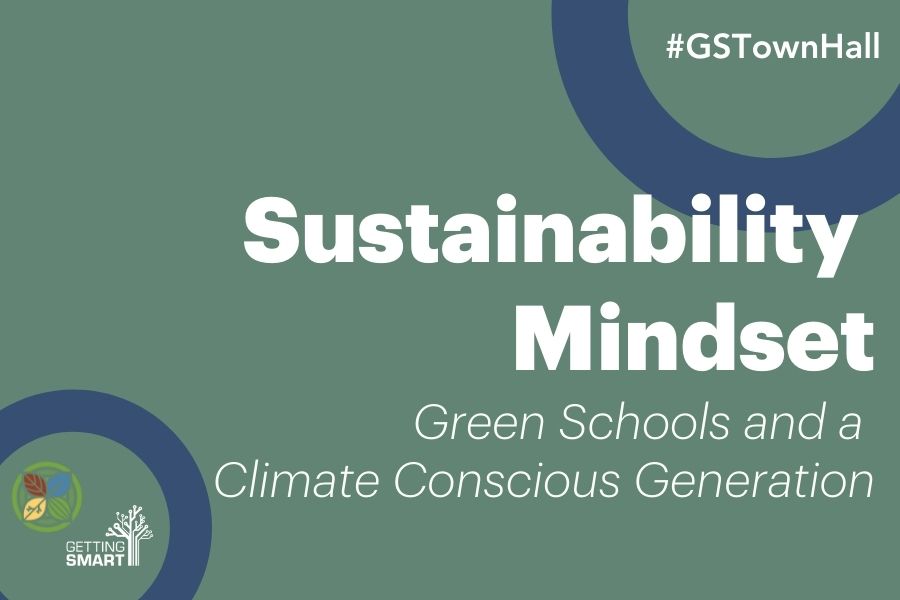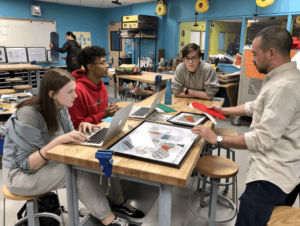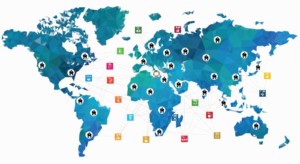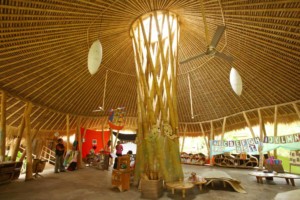Town Hall Recap: Green Schools

This episode of the Getting Smart Podcast is sponsored by Smart Sprints.
We recently hosted a Getting Smart Town Hall alongside Green Schools National Network to spotlight some of their recent work on establishing a GreenPrint, a framework and philosophy for building an ecosystem of sustainability minded schools and learners.
As usual, we began with a poem. This one is a bit more biting than usual.
Let them not say by Jane Hirshfield
Let them not say: we did not see it.
We saw.
Let them not say: we did not hear it.
We heard.
Let them not say: they did not taste it.
We ate, we trembled.
Let them not say: it was not spoken, not written.
We spoke,
we witnessed with voices and hands.
Let them not say: they did nothing.
We did not-enough.
Let them say, as they must say something:
A kerosene beauty.
It burned.
Let them say we warmed ourselves by it,
read by its light, praised,
and it burned.
The group was moved by the poem’s urgency and, together, we quietly sought to answer the question of “what is burning?”. While the poem reads as an indictment of our response to early scientific evidence of the impact of humans on the earth, the prompt of “let them not say” opens itself up to opportunity. We can act. We can work to change the story.
The GreenPrint from Green Schools National Network is a great step in this direction. Not only does it focus on resources and facilities, but it also works to better serve students from a mental health and equity perspective. You can read more about it here.
One of the attendees Thea DePetris highlighted the outstanding work that enviroschools have been doing in New Zealand for years. These schools support local curriculum and partner with communities.
One guest, Bob Hill, proposed navigating climate-based questions by asking “What is a mercy thing we can do? What is a justice thing we can do?”
Maggie Favretti shared “Youth well-being and resilience relies on efficacy and agency—what better purpose than climate challenges in communities?”
Tim Baird, one of the representative from Green Schools National Network, shared “the engaging aspect of the work these students were doing was so powerful it drew me in then I realized this is so impactful on not only the students but on our community.”
Adam Kaplan also contributed some hope to the conversation, “I think Sustainability is a flexible enough concept that we can do good work together within and among systems in order to support our missions.”
Check out the links that were mentioned in the chat during the town hall by clicking here.
What’s Next?
Our next Getting Smart Town Hall will be on January 20th, 2022 and we will discuss What’s Next in Learning in 2022. During this event we will cover what we are thinking about, what we plan to write about and what you are thinking about as well! You can register here.
One of these topics is sure to be Green Schools, an ongoing point of interest for Getting Smart, as well as a challenge that all young people need to be armed to confront.
This post is a part of Green Schools campaign. The climate crisis is the most complex challenge mankind has ever faced. It will require collaboration, shared truth and innovation at a scale that has yet to be realized. Through blogs, conversations and events we will focus on what to teach, how to teach it and how to create a climate positive school community so that our upcoming generations know what they are up against and have a shared understanding of the challenges and opportunities ahead. You can engage with this ongoing campaign using #GreenSchools.





0 Comments
Leave a Comment
Your email address will not be published. All fields are required.